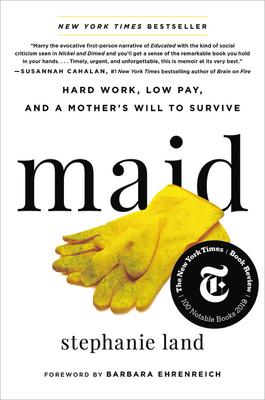
Stephanie Land almost broke my tear ducts with her memoir.
Maid is a crucial, desperate, important installment in showing that people in poverty are some of the hardest working, least appreciated, most disadvantaged people in our society. The next time I hear someone say people in poverty are lazy, I hope I can recommend this book to them.
Maid:
Hard Work, Low Pay, and a Mother's Will to Survive
Stephanie Land is a single mother struggling to escape domestic abuse, to keep custody of the child her partner never wanted but fights her for at every turn, and to provide enough for her daughter so they can at least survive. She narrates a messy, belittling, dehumanizing journey of food stamps that never provide enough food, homeless shelters that can't offer proper shelter, and low-income housing that could be ripped away at the merest threat of a $50 emergency.
"Struggling to make ends meet" is probably the most passive, deplorable, understatement one could apply to this woman's life. Throughout the memoir, Land takes painstaking creative steps to illustrate the sheer reality: she's not making ends meet at all. She rations her coffee in the morning to quell her hunger so that her daughter can have more to eat. She can't afford produce unless it's below a certain price-point, but the middle-class shoppers at the grocery store vocally harass her for buying less nutritious food - the only food that she can afford - and for making them wait longer because of her food stamps. The amount of times other shoppers shout "You're welcome!" at her because she's using food stamps from the government, funded by taxpayer money, is atrocious.
At one point, Land and her daughter are using eight different government programs at once, just to survive. The way that the various government programs operate, qualifying for one may disqualify her for another. If she makes slightly more money from her multiple part-time (minimum-wage) jobs, that extra pocket change could tip her over the edge and disqualify her for another program or two, leaving her scrambling again the next month. The system is built in such a way that it beats her down and keeps her there, and I don't know where she finds the will to beat it back, but she does, in a white-knuckled, teeth-gritted kind of way
Maid is a stepping stone to addressing and erasing the stigma around people in poverty; to establishing the compassion and empathy we need to work towards a better world. I'd recommend it to anyone, but especially to the middle-class and the rich - the more financially privileged people in society.
--Elise T.--
For more information on
Maid by Stephanie Land, visit our website
here.


